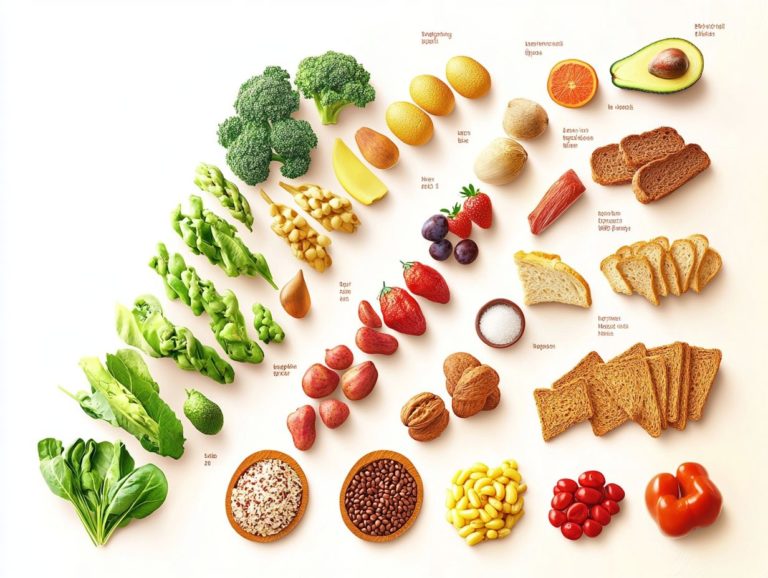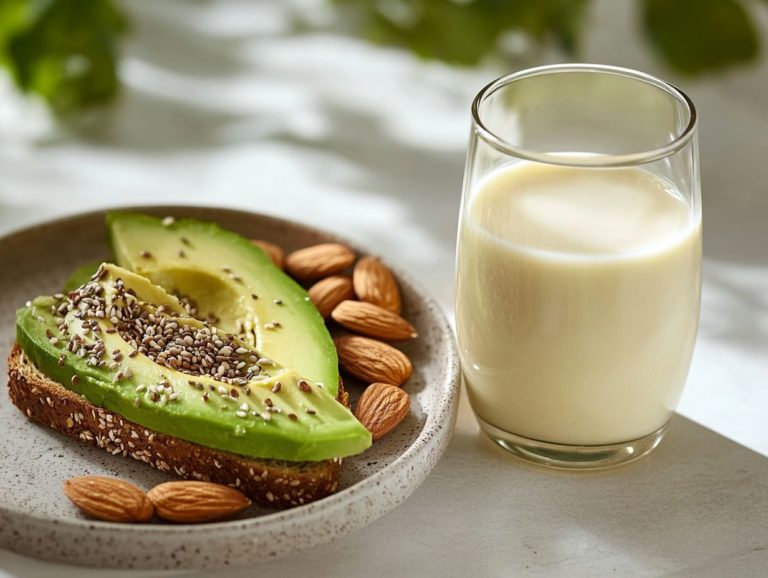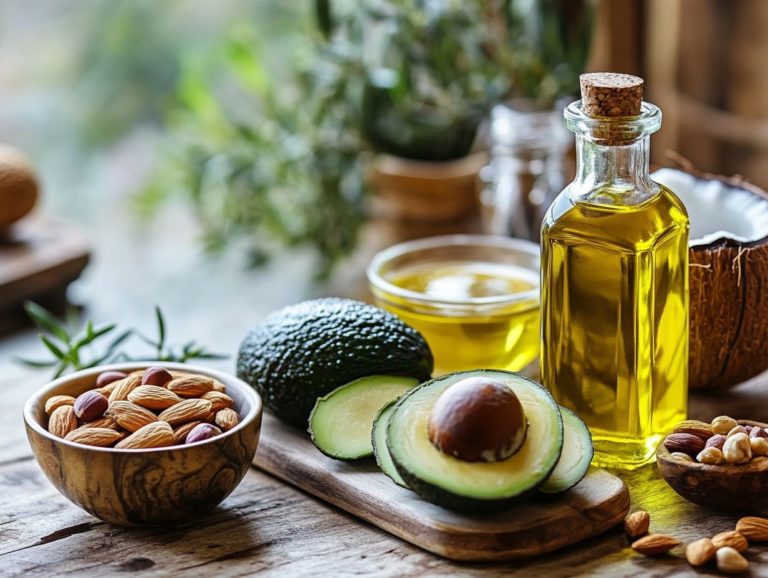Understanding the Carb Counts of Different Nuts
Monitoring your carbohydrate intake is crucial for maintaining a balanced diet and supporting weight management. This is especially true if you re embracing a low-carb lifestyle.
Nuts, celebrated as superfoods, can be an essential part of this dietary strategy. This article delves into what nuts are, their carb counts, and how they can effortlessly fit into your low-carb diet. Different nut varieties such as almonds, cashews, and walnuts provide diverse nutritional benefits.
It also covers the benefits, potential risks, and inventive ways to incorporate these nutritious snacks into your meals. This includes serving size recommendations and healthy snack alternatives.
Experience the joy of enjoying nuts while effortlessly managing your carb intake!
Contents
- Key Takeaways:
- Why Is It Important to Monitor Carb Intake?
- What Are Nuts?
- How Do Nuts Fit into a Low-Carb Diet?
- What Are the Carb Counts of Common Nuts?
- How Can Nuts Be Incorporated into a Low-Carb Diet?
- Are There Any Risks or Precautions When Consuming Nuts on a Low-Carb Diet?
- Frequently Asked Questions
- What are the carb counts of different nuts and their nutritional breakdown?
- Which nuts have the lowest carb counts?
- Why are some nuts higher in carbs than others?
- Do the carb counts of nuts change when they are roasted or salted? Are there healthier food alternatives?
- How should I incorporate nuts into my low-carb diet?
- Can I eat unlimited amounts of nuts if I am on a low-carb diet?
Key Takeaways:

- Nuts are a great source of healthy fats, protein, and dietary fiber. It’s important to monitor their carb counts to maintain a low-carb diet.
- Almonds, cashews, and peanuts are among the nuts with the lowest carb counts. In contrast, pistachios and Brazil nuts are higher in carbs.
- You can incorporate nuts into a low-carb diet in various ways. For instance, they can be used as toppings for salads or included in low-carb breading for chicken or fish.
Why Is It Important to Monitor Carb Intake?
Monitoring your carbohydrate intake is essential for maintaining optimal health. This is particularly important if you re managing conditions like diabetes, where blood sugar levels are crucial to your overall well-being.
Keeping track of your carb consumption also helps manage triglycerides and maintain heart health. Carbohydrates significantly impact your energy levels, and understanding their effects is crucial for effective weight management.
By monitoring your carb consumption and calorie count, you can make informed dietary choices that align with recommended daily values. This supports a balanced and nutritious diet.
Adhering to dietary guidelines not only helps control blood sugar but also enriches your overall health. This allows you to incorporate a diverse array of food options into your meal plans.
What Are Nuts?
Nuts are packed with nutrients. They are a rich source of healthy fats, protein, and dietary fiber, making them a top choice for those who prioritize their health. They are also natural sources of essential vitamins and minerals.
With options like almonds, walnuts, and pecans, you ll find they provide essential nutrients such as vitamin E and antioxidants. These nutrients play a significant role in promoting heart health and overall well-being. They also have anti-inflammatory and cholesterol-lowering properties.
Incorporating nuts into your diet is linked to numerous health benefits. These include boosted energy levels and effective weight management. This showcases their essential role in a balanced diet.
Their unique nutritional profile makes nuts an outstanding addition to any meal plan aimed at enhancing your daily dietary values.
How Do Nuts Fit into a Low-Carb Diet?
Nuts can be a game changer in your low-carb diet. They offer a nutrient-rich and energy-dense option that perfectly aligns with your goals of reducing carbohydrate intake.
By incorporating a variety of nuts as healthy snacks, you can enjoy essential nutrients while keeping both your carbohydrate and calorie counts in check. This effectively helps you manage your weight.
It’s important to be mindful of your serving sizes. Nuts are calorie-dense; moderation is key to achieving balance within your low-carb meal plan. Their beneficial fats and protein content contribute to your satiety. This makes them an excellent choice for anyone following dietary guidelines focused on low-carb consumption.
Nuts provide a satisfying crunch and help maintain blood sugar levels.
What Are the Carb Counts of Common Nuts?
Understanding the carbohydrate counts of common nuts is crucial for anyone aiming to maintain a low-carb diet while savoring the delightful variety of nuts available. Each type of nut has its own unique carbohydrate content. For example, almonds and pecans boast lower carb counts compared to cashews and chestnuts. A comparison chart of the nutritional content can help you make better selections.
Beyond their carb levels, nuts are packed with an abundance of nutrients, including healthy fats, protein, and dietary fiber. These enhance their overall nutritional value. By carefully examining the calorie counts and nutritional profiles of each nut, you can make informed choices that align perfectly with your dietary goals. Utilizing a nutritional breakdown of nuts can aid in understanding their effects on your body.
1. Almonds
Almonds are not just delicious; they are incredibly versatile and packed with nutrients! They re rich in healthy fats, high protein content, and an abundance of dietary fiber, making them an exceptional snack choice for anyone pursuing balanced nutrition.
These nutrient-dense gems are loaded with vitamin E and antioxidants, contributing to a multitude of health benefits, including support for heart health and enhanced energy levels. They are known for their ability to lower bad cholesterol levels due to their healthy fats.
With their low carbohydrate count, almonds seamlessly fit into a low-carb diet, offering satiety while promoting effective weight management. To truly enjoy the benefits of almonds, consider a serving size of about a quarter-cup just enough to provide a satisfying crunch without tipping into overindulgence.
While almonds are generally safe for consumption, it s wise to remain mindful of any potential allergens or sensitivities. Incorporating these nuts into your daily meals is effortless; they can be sprinkled on salads, blended into smoothies, or savored as a standalone snack. They also make great ingredients for healthy snack alternatives or homemade nut butter.
For those seeking to maximize their nutritional intake, almonds serve beautifully as a base for homemade nut butter, elevating a variety of dishes from your morning oatmeal to that delightful afternoon yogurt.
2. Cashews

Cashews are a beloved nut variety, loved for their creamy texture and unique taste. They offer a rich source of unsaturated fats and essential nutrients that support your overall health. Cashews are particularly high in magnesium, zinc, and iron, which support various body functions.
While they have a slightly higher carbohydrate content compared to other nuts, they generously contribute to your protein intake and make for delightful healthy snacks, seamlessly complementing a range of dishes.
Just keep an eye on the calorie count when indulging in cashews; their energy density can lead to overindulgence if you re not mindful of portion sizes. Moderation is key to reaping their health benefits without exceeding your daily calorie intake.
Incorporating these vibrant nuts into your recipes can elevate both the taste and texture of your meals. Whether you sprinkle them on salads, blend them into creamy sauces, or enjoy them as a standalone snack, they enhance your culinary experience.
Beyond their deliciousness, cashews are packed with vital vitamins and minerals like magnesium, zinc, and iron, delivering numerous health benefits, including improved heart health and enhanced immune function.
It s crucial to enjoy cashews in moderation. A small handful is often sufficient to reap their nutritional rewards without overwhelming your calorie intake. By balancing them with other nutrient-dense foods, cashews can effortlessly integrate into your healthy diet.
Incorporate nuts into your diet for both taste and health benefits!
3. Peanuts
Peanuts may be technically legumes, but they re often grouped with nuts for good reason. They provide a satisfying crunch and boast a robust nutritional profile filled with plant compounds, healthy fats, and plenty of protein.
As a great source of dietary fiber, peanuts aid digestion and help you feel full, making them an excellent choice for snacking or adding to your favorite dishes. Enjoy them in moderation; they can serve as a low-carb option that supports weight management and heart health.
Rich in monounsaturated and polyunsaturated fats, peanuts can be a boon for your cardiovascular health by helping to lower bad cholesterol levels. They re also packed with essential vitamins and minerals like magnesium, potassium, and vitamin E, offering antioxidant properties that can help combat damage from free radicals.
Consider enhancing your meals by adding peanuts to salads, smoothies, or sauces they can elevate both flavor and nutrition. Just be mindful of potential allergic reactions and keep an eye on portion sizes due to their calorie density.
Incorporating peanuts into a low-carb diet is a breeze. They pair beautifully with vegetables or can easily replace higher-carb snacks, making them a versatile choice for anyone looking to maintain a health-conscious lifestyle.
4. Pecans
Pecans are a deliciously rich nut, celebrated for their buttery flavor and impressive nutritional profile. Packed with healthy Omega-3 fats and beneficial antioxidants, they promote heart health while offering a satisfying snack option.
If you’re following a low-carb diet, you’ll appreciate that pecans are lower in carbohydrates than many other nuts, making them a smart choice. Just keep in mind that their calorie count is on the higher side, so moderation is key to enjoying their health benefits without going overboard on calories.
Pecans also provide a good amount of dietary fiber and help in lowering triglycerides. Beyond their heart-healthy perks, they are packed with essential vitamins and minerals, including magnesium, zinc, and vitamin E, all of which contribute to your overall well-being.
Their antioxidant properties combat oxidative stress, potentially lowering the risk of chronic diseases. Pecans also have anti-inflammatory benefits, making them a valuable addition to your diet.
As a culinary enthusiast, you can incorporate pecans into a wide range of recipes from salads and baked goods to savory dishes and nut butter. For anyone keeping an eye on carbohydrate intake, adding pecans to meals not only enhances flavor but also provides that satisfying crunch.
Including pecans as part of your daily diet can support digestive health and energy levels.
5. Walnuts
Walnuts truly shine among nut varieties, celebrated for their impressive Omega-3 fat content, known for its anti-inflammatory properties and heart health benefits. These nutrient-dense gems are not just tasty; they’re packed with an array of vitamins and minerals, including magnesium and iron, positioning them as a functional food that bolsters overall wellness.
With their modest carbohydrate count, walnuts can seamlessly fit into a low-carb diet, promoting satiety and aiding in weight management while elevating your meals with their unique flavor and crunchy texture.
Incorporating walnuts into your daily meals is both simple and delightful. Try adding chopped walnuts to your salads; not only do they enhance the texture, but they also increase the healthy fat content, resulting in a more satisfying dish.
You can effortlessly blend them into smoothies for an extra nutrient boost or sprinkle them atop yogurt or oatmeal at breakfast to elevate your protein and fiber intake.
As a convenient snack, a handful of walnuts can help quell your hunger while delivering essential antioxidants. In terms of cooking, walnuts offer versatility; they can be included in baked goods like muffins or energy bars, making them a delicious choice for a variety of dietary preferences.
Experiment with these nuts in your favorite dishes today!
6. Pistachios
Pistachios are a delightful nut variety. They offer a unique balance of protein, healthy fats, and dietary fiber, making them a satisfying snack alternative if you re managing your carbohydrate intake.
With their vibrant green hue and distinct flavor, they provide a nutritious option and create an enjoyable eating experience. By incorporating pistachios into your low-carb diet, you can contribute to weight management while supporting overall health, thanks to their rich nutrient profile and ability to provide energy.
These small but mighty nuts pack a powerful punch. A single serving delivers a substantial amount of plant-based protein alongside a generous dose of dietary fiber that promotes digestive health.
The healthy fats in pistachios are predominantly unsaturated, which are heart-friendly and help maintain stable energy levels throughout the day. Practice portion control to avoid overindulging. Even in small amounts, adding pistachios to salads or using them as a topping for yogurt can elevate your meals, making them both appetizing and beneficial.
7. Macadamia Nuts
Macadamia nuts are truly a gem. They are renowned for their rich healthy fats and creamy texture, making them a decadent addition to your nutritional routine, particularly if you re following a low-carb diet.
While they carry a higher calorie count than other nuts, it s wise to enjoy them mindfully to stay within your daily caloric goals. They provide a satisfying snack that effectively curbs cravings while delivering essential nutrients.
Not only do these nuts tantalize your taste buds, but they also offer a wealth of monounsaturated fats that are beneficial for heart health. If you’re looking to elevate your meals, consider adding macadamia nuts to salads, yogurt, or smoothies for a delightful crunch and a boost of essential vitamins and minerals.
Their buttery flavor lends itself beautifully to baking, elevating cookies and cakes to an exquisite level. You can even transform them into nut butter for a nutritious spread on toast or fruits, showcasing their versatility in both sweet and savory dishes.
8. Brazil Nuts

Brazil nuts stand out for their remarkable selenium content, which is vital for antioxidant defense and heart health. They are packed with healthy fats as well. As energy-dense morsels, it s important to enjoy them in moderation due to their higher calorie count.
With their low carbohydrate profile, Brazil nuts seamlessly fit into a low-carb eating plan. They deliver unique health benefits while satisfying your taste buds.
These nuts are a fantastic source of nutrients. A handful of Brazil nuts can be a nutritious snack on their own or serve as a delightful enhancement to salads and trail mixes.
Their creamy texture and buttery flavor make them perfect for whipping up nut butter or elevating your baked goods. Aim for about one to three nuts daily to enjoy the selenium benefits without overindulging in calories.
By incorporating Brazil nuts into your meals, you not only elevate their nutritional value but also align perfectly with a low-carb lifestyle.
9. Hazelnuts
Hazelnuts are not just any nut; they re a delightful variety bursting with flavor and brimming with healthy fats, dietary fiber, and antioxidants. If you’re health-conscious, they make a superb addition to your diet.
These little gems support heart health and are a low-carb option, allowing you to include them in your meal plans without a significant impact on your carbohydrate intake. Just keep an eye on your portion sizes, as their calorie density means you ll want to enjoy their rich taste while still sticking to your weight management goals.
Beyond their heart-healthy monounsaturated fats, hazelnuts are a fantastic source of vitamin E, which is great for your skin and boosts your immune system. A typical serving size is about one ounce roughly twenty whole nuts which provides a generous amount of fiber to aid digestion and keep you feeling satisfied.
For those embracing a low-carb lifestyle, hazelnuts can effortlessly enhance your meals. Toss them into salads, blend them into smoothies, or relish them as a solo snack.
Their versatility shines as they can also be transformed into nut butters or used as a topping for yogurt, elevating both the flavor and nutritional value of your dishes. Don’t wait! Grab some hazelnuts today to boost your meals and enjoy their delicious flavor!
10. Pine Nuts
Pine nuts may be small, but they pack a powerful punch. They offer a delightful mix of healthy fats, protein, and antioxidants that can significantly enhance your overall health. Their rich, distinctive flavor makes them a fantastic addition to salads, pestos, and snacks. They elevate your culinary creations while seamlessly fitting into a low-carb diet.
However, given their calorie content, it’s wise to enjoy pine nuts in moderation. This ensures you savor their taste and health benefits without compromising your dietary goals.
Incorporating these nutrient-dense seeds into your meals is both simple and delicious. You can sprinkle them on yogurt or oatmeal for that perfect crunch and added protein. Alternatively, blend them into smoothies for a luscious, creamy texture.
As an excellent source of monounsaturated fats, pine nuts support heart health and help maintain healthy cholesterol levels. When you roast them lightly, they develop a rich, buttery flavor, making them ideal for topping roasted vegetables or mixing into grain dishes.
Don t miss out on the incredible versatility of pine nuts! Add them to your meals now to boost your health!
How Can Nuts Be Incorporated into a Low-Carb Diet?
Incorporating nuts into your low-carb diet can be both delightful and advantageous. These nutritious snacks not only align perfectly with your weight management goals but also provide essential nutrients that promote overall well-being.
By thoughtfully selecting nut varieties and paying attention to serving sizes, you can savor the rich flavors and health benefits of nuts. Enjoy them sprinkled atop salads, blended into smoothies, or as standalone snacks. These contributions lead to a balanced and nutritious diet.
Are There Any Risks or Precautions When Consuming Nuts on a Low-Carb Diet?
While nuts present a wealth of health benefits, it s important to consider certain risks and precautions when incorporating them into your low-carb diet. Focus especially on portion sizes and calorie counts. Consuming nuts in moderation is key to avoiding excessive saturated fat and managing your weight effectively.
Overindulging in nuts can result in excessive calorie intake, which may pose challenges to your weight management goals and affect your daily nutritional values.
If you have specific health concerns, such as high cholesterol or nut allergies, approach nut consumption carefully. Seek personalized guidelines from your healthcare provider. Monitoring your daily nutritional values and understanding the physiological effects of nuts can help mitigate risk factors.
Frequently Asked Questions
What are the carb counts of different nuts and their nutritional breakdown?

The carb counts of different nuts vary depending on the type of nut. For example, 1 ounce of almonds contains 6 grams of carbs, while 1 ounce of cashews contains 9 grams of carbs.
Which nuts have the lowest carb counts?
Nuts with the lowest carb counts include macadamia nuts, pecans, and walnuts. Each of these contains 1-2 grams of carbs per ounce. These nuts also provide a good balance of protein, healthy fats, and essential nutrients.
Why are some nuts higher in carbs than others?
Some nuts, such as cashews and pistachios, have higher carb counts because they contain more starch and sugar compared to other nuts. These differences arise from the natural sources of nutrients and plant compounds found in each type of nut.
Do the carb counts of nuts change when they are roasted or salted? Are there healthier food alternatives?
Yes, the carb counts of nuts may change slightly when they are roasted or salted. However, the difference is minimal and should not greatly affect your overall carb intake. Nuts also provide valuable nutrients like dietary fiber, vitamin E, and magnesium, which are beneficial for heart health and overall well-being.
How should I incorporate nuts into my low-carb diet?
Adding different types of nuts like almonds, walnuts, and pistachios to your low-carb diet can offer numerous health benefits. These nuts are rich in plant compounds and antioxidants. They support your digestive system and reduce inflammation.
They can also provide healthy fats, protein, and essential nutrients like potassium and iron. However, it is important to measure your serving sizes to avoid consuming too many carbohydrates while maintaining balance in your daily diet.
Can I eat unlimited amounts of nuts if I am on a low-carb diet?
No, you still need to monitor your nut intake on a low-carb diet. While they may be a healthier snack option, consuming too many can contribute to excess calories and hinder weight loss efforts.
Paying attention to the nutritional content and calorie count per serving is crucial for effective weight management. Some types of nuts have higher levels of saturated fat, so moderation is key to maintaining optimal health and energy levels.






